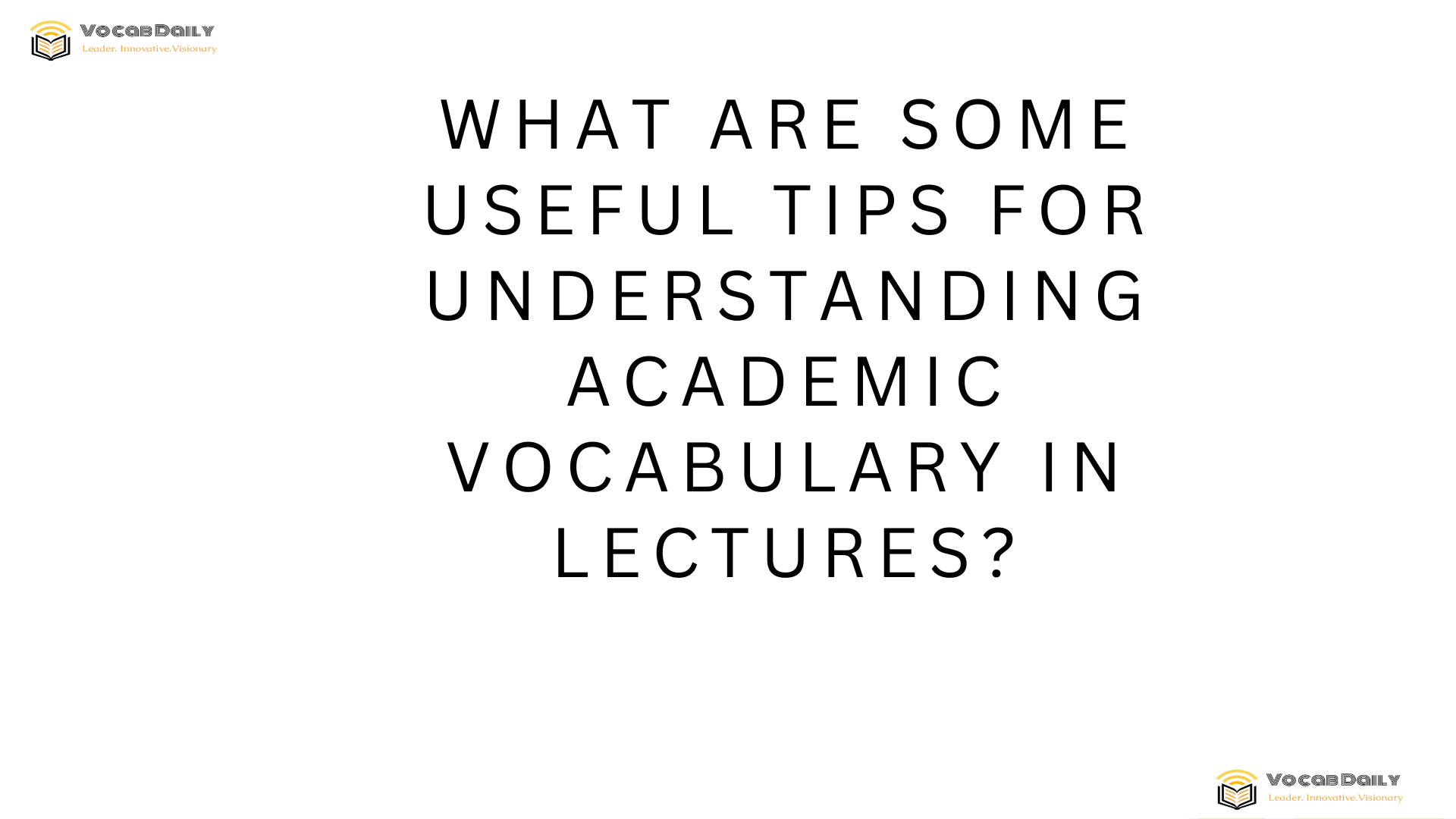What are some useful tips for understanding academic vocabulary in lectures
Focus on Key Vocabulary Before Lectures
One of the best ways to improve understanding of academic vocabulary during lectures is to prepare ahead of time. Reviewing relevant keywords and phrases related to the subject matter before attending a lecture gives you a head start. This pre-exposure helps you recognize important terms when the lecturer mentions them and makes it easier to understand complex concepts. Many professors provide reading lists, course syllabi, or lecture outlines in advance; use these resources to identify and study academic vocabulary related to the topic.
Use Context Clues to Decode Meaning
When unfamiliar vocabulary arises during a lecture, try to infer the meaning from context. Pay close attention to how the lecturer uses the word in a sentence, the examples they give, and the overall topic being discussed. Context clues can include synonyms, antonyms, explanations, or even visual aids. This strategy is very effective because academic lectures often introduce new terms with some supportive explanation. Training yourself to quickly pick up these hints prevents you from getting stuck and helps improve your active listening skills.
Take Strategic Notes to Capture Vocabulary
Note-taking is an essential skill in lectures, especially for academic vocabulary acquisition. Instead of trying to write everything down, focus on capturing keywords and phrases that seem important or unfamiliar. Use abbreviations or symbols to keep up with the pace of the lecture. You can also create your own personalized shorthand for vocabulary words and their definitions. Later, reviewing and expanding upon these notes will reinforce your understanding and aid memorization. This focused approach to note-taking saves time and improves retention.
Ask Questions to Clarify Vocabulary
Don’t hesitate to ask for clarification when a term or concept is unclear. Many lecturers welcome questions as they know academic vocabulary can be challenging for students. If asking during the lecture is intimidating, consider staying after class or sending an email. Occasionally, forming study groups with classmates to discuss difficult vocabulary can also offer fresh perspectives and explanations that resonate more personally. Engaging actively with vocabulary in this way increases your chances of mastering it effectively.
Use Flashcards and Vocabulary Apps
Flashcards remain one of the most practical tools for learning and retaining academic vocabulary. Whether physical cards or digital platforms, flashcards encourage repetition and active recall, which are key learning principles. Many apps also provide features such as spaced repetition and example sentences, which deepen your comprehension. Regular short sessions with flashcards make academic language learning manageable and less overwhelming, especially after absorbing multiple new words from lectures.
Practice Using New Vocabulary in Writing and Speaking
Simply understanding vocabulary during lectures is not enough – using new words helps commit them to long-term memory. Try incorporating new terms into your assignments, essays, or class discussions. This not only boosts your vocabulary but also builds confidence in expressing academic ideas clearly. Even journaling your thoughts about lecture content using recently learned words can provide valuable practice. Experience in using academic vocabulary actively supports deeper learning and academic success.
Listen to Academic Podcasts and Videos
Supplementing lectures with additional academic listening materials helps you encounter vocabulary repeatedly in different contexts. Podcasts and educational videos often present topics at a pace and style that enhances comprehension. Hearing words used naturally improves pronunciation, intonation, and listening skills. Many platforms provide transcripts, allowing you to read along. This multimodal approach strengthens your grasp of academic vocabulary and prepares you better for real-time lecture comprehension.
Break Down Complex Terms into Smaller Parts
Academic vocabulary often includes multi-syllable or compound words that can seem intimidating at first. Breaking these terms into smaller parts such as prefixes, roots, and suffixes reveals their meanings and connections to other words. For example, understanding that “bio-” relates to life or “-ology” refers to the study of something can clarify a term like “biology.” Strengthening your knowledge of word origins (etymology) not only aids recognition but also equips you to guess meanings of unfamiliar vocabulary encountered in lectures.
Maintain a Personal Academic Vocabulary Journal
Keeping a dedicated journal or digital document for academic vocabulary enhances your learning process. In this journal, record new words, their definitions, example sentences, and any relevant notes from lectures. Organizing vocabulary thematically or by subject can make it easier to review later. Revisiting the journal regularly reinforces your memory and shows how your academic language skills are growing over time. Creating connections between words in the journal also supports deeper understanding and application.
Engage Actively During Lectures
Active engagement is a crucial strategy when it comes to understanding academic vocabulary. Focus your attention fully on the speaker, maintain eye contact if possible, and mentally summarize ideas as you listen. Avoid distractions like phones or unrelated tasks. Mentally predicting what words the lecturer might use based on the topic also primes your brain for easier vocabulary recognition. Staying involved helps you pick up on subtle cues and reduces the chances of missing important terminology.
Utilize Academic Word Lists
Many educational institutions and language learning platforms provide curated academic word lists, such as the Academic Word List (AWL), which include high-frequency vocabulary for academic contexts. Studying these lists systematically helps you target words that are likely to appear often in lectures across various subjects. Familiarity with these controlled vocabulary sets accelerates your understanding and gives you confidence when encountering these terms during academic presentations.
Develop Listening Skills Through Practice
Improving your overall listening skills is key to grasping academic vocabulary. Try listening to recorded lectures, speeches, or debates on different topics to train your ear to different accents, speeds, and academic registers. Practicing note-taking while listening to these materials simulates the lecture environment and helps condition your brain to process and comprehend academic language in real time. Better listening proficiency naturally leads to greater vocabulary absorption.
Also check out VocabDaily workbook collections.

Leave a Reply